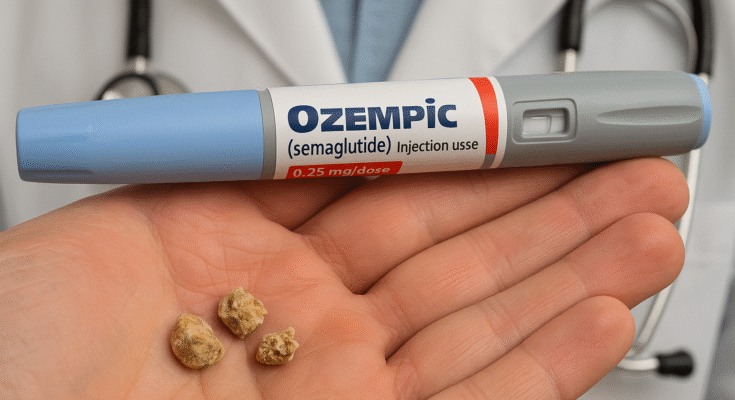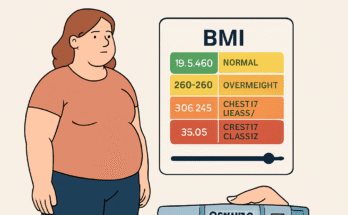Ozempic, a medication celebrated for its effectiveness in managing type 2 diabetes and promoting weight loss, has become a household name. Its active ingredient, semaglutide, mimics a hormone that regulates blood sugar and appetite, offering hope to millions striving for better health. But as its popularity soars, so do questions about its safety. One concern that has surfaced is whether Ozempic can cause kidney stones—a painful condition that affects roughly one in ten people at some point in their lives. As a medical expert, I’ll dive into the science, explore the evidence, and address whether this widely used drug might contribute to kidney stone formation. Let’s unpack the facts with clarity and curiosity, separating hype from reality.
Understanding Ozempic and Its Mechanism
To grasp the potential link between Ozempic and kidney stones, it’s worth understanding how this drug works. Ozempic is a GLP-1 receptor agonist, a class of medications that enhances insulin secretion, slows digestion, and reduces appetite. These effects make it a powerful tool for controlling blood sugar in diabetic patients and supporting weight loss in those struggling with obesity. Administered as a weekly injection, Ozempic has transformed lives by helping patients achieve significant weight reduction and better glycemic control. However, like any medication, it interacts with the body in complex ways, and its effects on organs like the kidneys deserve scrutiny. The kidneys, after all, are vital for filtering waste and maintaining fluid balance—processes that, when disrupted, can lead to conditions like kidney stones.
What Are Kidney Stones?
Kidney stones are hard deposits of minerals and salts that form in the kidneys when urine becomes concentrated, allowing substances like calcium, oxalate, or uric acid to crystallize. These stones can range from tiny grains to golf ball-sized obstructions, causing excruciating pain, blood in the urine, and sometimes infections or blockages. Risk factors include dehydration, high-sodium or high-oxalate diets, obesity, and certain medical conditions like diabetes or gout. Given that Ozempic is often prescribed to patients with diabetes or obesity—both of which are linked to kidney stone risk—it’s reasonable to wonder if the drug itself could tip the scales toward stone formation.
The Evidence: Does Ozempic Play a Role?
The question of whether Ozempic directly causes kidney stones is tricky, as the evidence is not straightforward. Clinical trials for Ozempic, including the STEP and SUSTAIN programs, have primarily focused on its efficacy for diabetes management and weight loss, with side effects like nausea, diarrhea, and pancreatitis being more commonly reported. Kidney stones, however, are not listed as a frequent adverse effect in these studies. That said, the kidneys are sensitive to changes in fluid balance, and Ozempic’s side effects, such as nausea and vomiting, could indirectly influence kidney health. For instance, vomiting or reduced fluid intake due to appetite suppression might lead to dehydration—a known risk factor for kidney stones. Dehydration concentrates urine, creating an environment where stones are more likely to form.
Some case reports and anecdotal discussions on platforms like X have raised concerns about kidney-related issues in Ozempic users, but these are not robust enough to establish causation. A 2023 study published in the Journal of Clinical Endocrinology & Metabolism explored GLP-1 receptor agonists and kidney outcomes but focused more on kidney function (like glomerular filtration rate) than stone formation specifically. The study found that GLP-1 agonists generally have a neutral or protective effect on kidney function in diabetic patients, potentially due to better blood sugar control and weight loss, which reduce stress on the kidneys. However, no large-scale studies have directly linked Ozempic to an increased risk of kidney stones.
Indirect Pathways: How Ozempic Might Contribute
While direct evidence is sparse, there are plausible indirect ways Ozempic could contribute to kidney stone formation. First, the drug’s appetite-suppressing effects can lead to reduced fluid and food intake. If patients aren’t mindful about staying hydrated, this could concentrate urine and increase stone risk. Second, rapid weight loss—a common outcome with Ozempic—can alter urine chemistry. For example, breaking down fat stores releases purines, which can increase uric acid levels in the urine, a key component of some kidney stones. Additionally, dietary changes that often accompany Ozempic use, such as low-carb or ketogenic diets, may elevate the risk of uric acid stones if not balanced properly.
Another consideration is Ozempic’s impact on the gastrointestinal system. The drug slows gastric emptying, which can lead to nausea or vomiting in some users. Persistent vomiting could cause dehydration and electrolyte imbalances, both of which are conducive to stone formation. Furthermore, patients with pre-existing conditions like hyperparathyroidism or a history of kidney stones might be more vulnerable to these effects. While these pathways are theoretical, they highlight the importance of monitoring hydration and diet while on Ozempic.
Weighing the Risks Against the Benefits
It’s critical to put these risks in perspective. Ozempic offers substantial benefits, particularly for those with type 2 diabetes or obesity-related health issues. Improved blood sugar control and weight loss can reduce the overall burden on the kidneys, potentially lowering the risk of chronic kidney disease, a far more serious condition than kidney stones for many patients. The theoretical risk of kidney stones, while worth considering, should not overshadow these benefits unless a patient has specific risk factors, such as a history of stones or poor hydration habits. For most users, the likelihood of developing kidney stones due to Ozempic appears low, but it’s not zero, especially for those already predisposed.
Practical Steps to Mitigate Risk
For patients on Ozempic, preventing kidney stones comes down to proactive habits. Staying well-hydrated is paramount—aim for at least 2.5 to 3 liters of water daily, unless advised otherwise by a doctor. Monitoring urine color (it should be pale yellow) can help ensure adequate fluid intake. A balanced diet is also key. While low-carb diets are popular among Ozempic users, avoiding excessive restriction of fruits and vegetables, which provide citrate (a natural stone inhibitor), is wise. Limiting sodium and oxalate-rich foods like spinach or nuts can further reduce risk. Regular check-ins with a healthcare provider can help monitor kidney function and catch any issues early, especially for those with a history of stones or other risk factors.
What the Future Holds
Research on Ozempic and kidney stones is still evolving. As more patients use GLP-1 agonists, post-marketing surveillance and real-world studies will shed light on rare or indirect side effects. For now, the lack of definitive data linking Ozempic to kidney stones suggests that the risk, if present, is likely minimal for most users. However, patients and doctors should remain vigilant, particularly for those with predisposing factors. The medical community continues to explore how GLP-1 agonists affect long-term kidney health, and future studies may clarify whether specific subgroups are at higher risk.
FAQs
1. Can I prevent kidney stones while taking Ozempic?
Yes, you can reduce the risk of kidney stones by staying well-hydrated, aiming for 2.5 to 3 liters of water daily, and maintaining a balanced diet. Avoid excessive sodium or oxalate-rich foods, and ensure you’re getting enough citrate from fruits like lemons or oranges, which can help prevent stone formation. If you have a history of kidney stones, discuss personalized strategies with your doctor to minimize risk while on Ozempic.
2. Should I stop taking Ozempic if I’m worried about kidney stones?
There’s no strong evidence that Ozempic directly causes kidney stones, so stopping the medication isn’t necessary unless advised by your doctor. If you’re concerned, focus on preventive measures like hydration and dietary balance. Discuss any symptoms, such as flank pain or blood in the urine, with your healthcare provider to determine the best course of action.
3. Are certain people more at risk for kidney stones while on Ozempic?
People with a history of kidney stones, dehydration, or conditions like hyperparathyroidism may be more vulnerable to stone formation while on Ozempic, especially if they experience side effects like vomiting or reduced fluid intake. Patients with diabetes or obesity, common Ozempic users, are already at higher risk for stones, so extra caution with hydration and diet is advisable.
Conclusion
The question of whether Ozempic causes kidney stones doesn’t have a simple yes-or-no answer. While no direct link has been established, the drug’s side effects, like dehydration from nausea or rapid weight loss, could theoretically increase the risk in certain individuals. For most users, the benefits of Ozempic—better blood sugar control, weight loss, and potentially improved kidney function—outweigh this hypothetical risk. By staying hydrated, eating a balanced diet, and working closely with a healthcare provider, patients can minimize any potential concerns while reaping the drug’s rewards. As research continues, we’ll gain a clearer picture, but for now, Ozempic remains a powerful tool when used thoughtfully.

Lisa Caldwell is a clinical health writer and certified diabetes educator with a strong background in pharmacology and metabolic health. With over 12 years of experience in patient education, she specializes in translating complex research on GLP-1 medications like Ozempic into clear, practical guidance.




